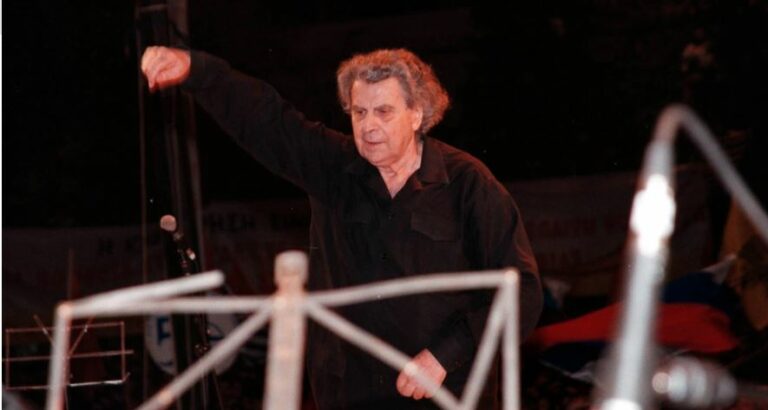Greece is in mourning, as internationally acclaimed Greek composer Mikis Theodorakis has passed away at the age of
The tragic news of the death of Mikis Theodorakis broke a few minutes ago.
The huge, perhaps the most important Greek composer of all time passed into immortality at the age of 96.
Actress Kakia Igerinou recently wrote about the sad news of the death of Mikis Theodorakis.
Mikis Theodorakis has written all kinds of music, from operas, symphonic music, chamber music, oratorios, ballet, and church choir, to music for ancient drama, theater, cinema, art-folk songs, and post-symphonic works. His work can be distinguished into three main periods: In the first period (1937-1960) he composes symphonic and chamber music works according to Western European forms and modern techniques, in the second period (1960-1980) he attempts to combine the symphony orchestra with folk instruments and creates new forms based on the voice, while since 1981 he returns to symphonic forms and deals with opera.
The composition of poems has been considered as the “central pillar of his creativity”, as the singer Nena Venetsanou has said. Some of the poets he melodised lyrics toinclude: Angelos Sikelianos, Andreas Kalvos, George Seferis, Odysseas Elytis, Giannis Ritsos, Manolis Anagnostakis, but also Pablo Neruda, Lorca, Bernard Biam. Their lyrics thus become accessible to the general public, framing folk songs that set fundamental values and constants in contemporary Greek music.
Mikis Theodorakis essentially created the movement of Melodic Poetry, contributing to the emergence of a number of poets and the upgrading of the song. At the same time, it has helped an entire generation gain its own voice.
He became internationally famous when he composed the music for the film Zorba the Greek (1964), directed by Michael Cacoyannis and starring Anthony Quinn. But he was becoming very popular even before that film, when he was composing music for the Jules Dassinfilm Phaedra (1962) starring Melina Mercouri, Anthony Perkins, Raf Vallone, and Kakogiannis’ Electra (1962) starring Irene Papas, Aleka Katselli. He even composed music for such acclaimed films like Z (1969) by Costa-Gavras starring Yves Montand and Papas, and Serpico (1973) by Sidney Lumet starring Al Pacino. He came back in 1974, but he stayed only for 6 years. Theodorakis was dissatisfied and went back in Paris and finished his third big work, Canto General, which together with the music from the film Zorba the Greek (1964) and “Axion Esti”, a piece of work based on the poems of the Nobel winner poet Odysseas Elitis.
During the 80s he became for one more time member of the Parliament and issue of controversy in the beginning of the 90s, when he collaborated with the right party’s prime minister Konstantin Mitsotakis. In 1992 he composed the Canto Olympico for the Olympic Games of Barcelona.
Mikis Theodorakis was born in the Greek island of Chios, in 1925. The exact same year that the other great composer of Greece was born in Xanthi, Manos Hatzidakis. He fought during the 2nd World War, and he was captured at the city of Tripoli. He was tortured, but when he was set free, he joined the partisan army of Greece named EAM, which means National Liberating Movement. He took part in the civil war in Greece which occurred during 1945-1949, always with the left parties of Greece. He was exiled for the first time in the island of Ikaria in 1947, he was transferred to the island of Makronisos in 1948.
Mikis Theodorakis was honoured with multople awards and distinctions, such as the “Lenin” Peace Prize of the Soviet Union (1983), the Order of the Brigadier General of the Order of the Phoenix awarded on July 24, 1995, by the President of the Republic Kostis Stefanopoulos the Order of the Legion of Honor officer, the highest distinction of the French Republic (March 1996). On May 27, 1996, the University of Athens “unanimously” awarded him an honourary doctorate from the Department of Music Studies, and in March 2000, he was awarded an honourary doctorate from the Department of Music Studies at the Aristotle University of Thessaloniki (AUTh). In July 2002 he was honored with the German Music Prize “Erich Korngold” and in May 2005 with the International Music Prize for 2005 by the International Music Council and UNESCO. Also, in March 2007 he was honored with the Brigadier General of the Legion of Honor of the French Republic, while in May 2013 the Plenary Session of the Academy of Athens elected him an honorary member and in December of the same year his official welcoming ceremony took place.
Ask me anything
Explore related questions





